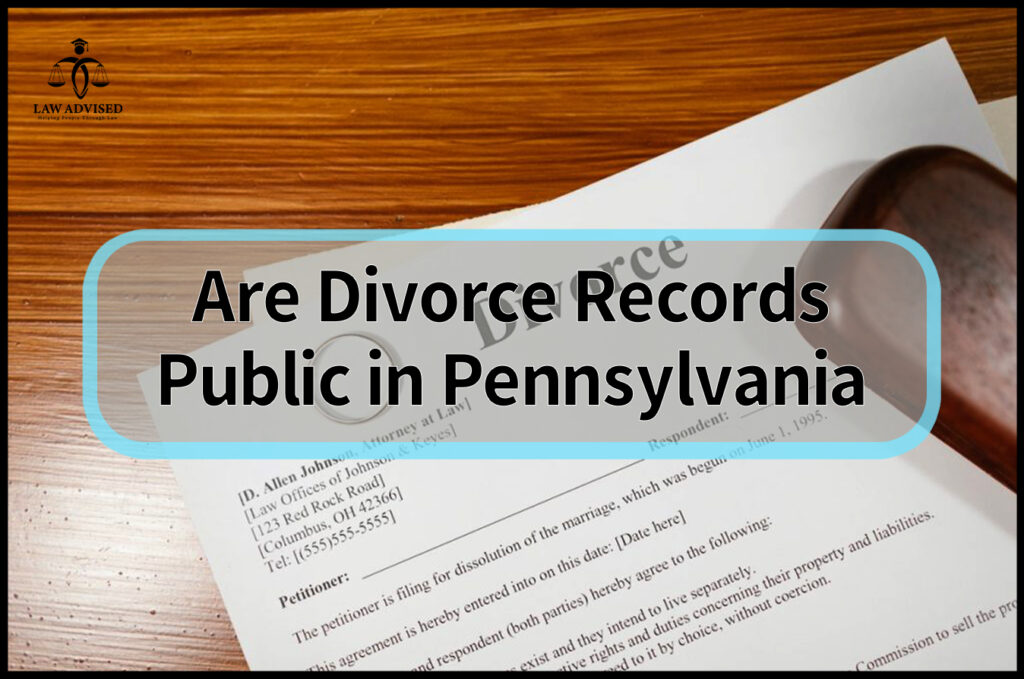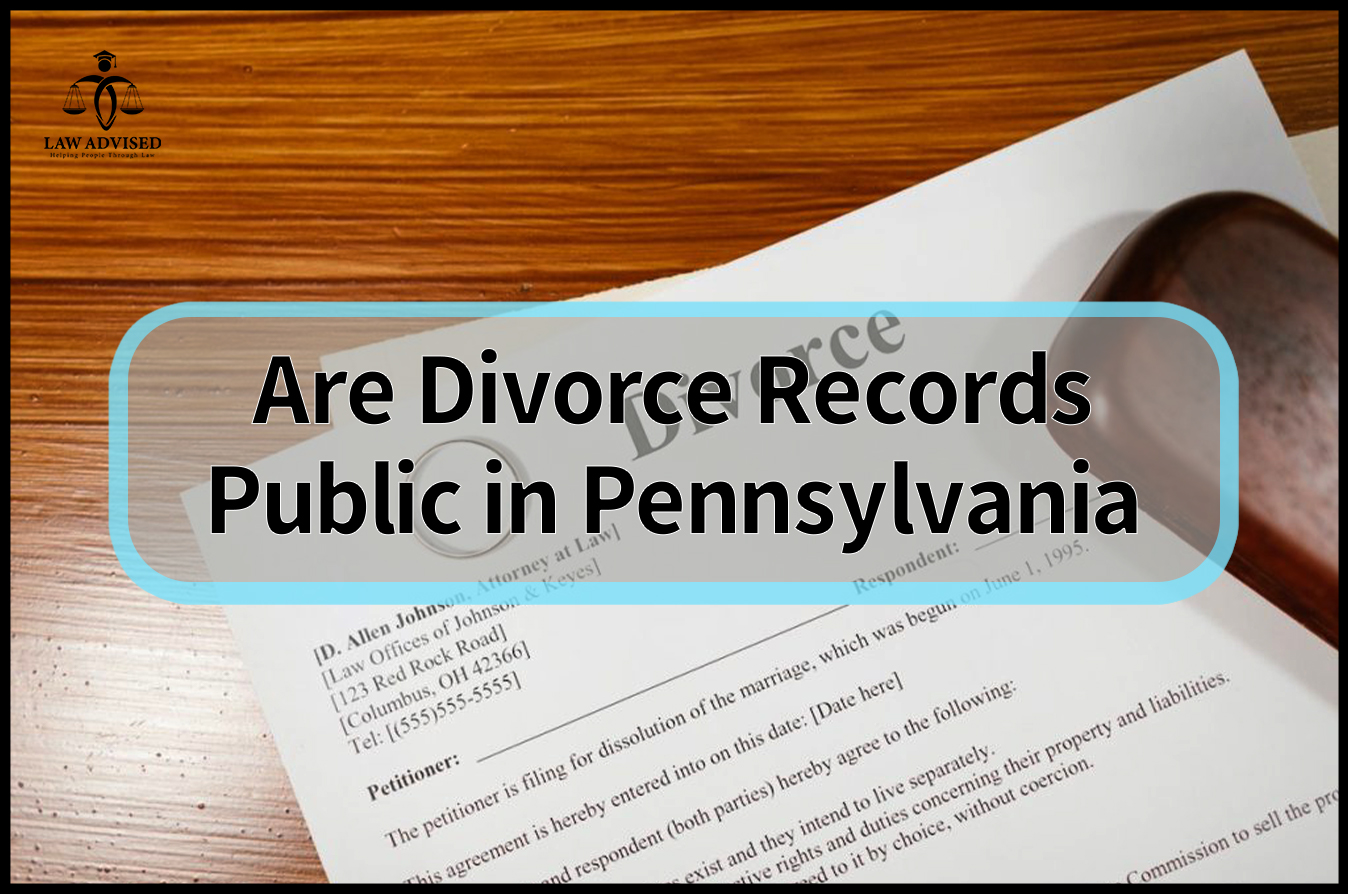Yes, divorce records in Pennsylvania are public and can be accessed by anyone. In Pennsylvania, divorce records are considered public information and can be accessed by the general public.
A divorce is a legal process that terminates a marriage and becomes a matter of public record. This means that anyone can access and view divorce records in Pennsylvania. These records typically contain crucial information such as the names of the individuals involved, the date of the divorce, and details about property division, child custody, and alimony arrangements.
Public access to divorce records allows individuals to gather information about someone’s marital status, verify divorce claims, or conduct genealogical research. However, it’s important to note that certain personal details, such as social security numbers or financial information, may be redacted or hidden to protect individual privacy. Overall, understanding that divorce records are public in Pennsylvania allows individuals to access relevant information for various purposes while ensuring transparency in the legal system.
Understanding The Availability Of Divorce Records
Divorce records in Pennsylvania are typically considered public records. This means that anyone can access them as they are deemed part of the public domain. However, it is important to note that there are legal considerations and privacy rights in place when it comes to accessing and obtaining these records.
In terms of privacy rights, individuals involved in the divorce may request to seal certain portions of the record for sensitive information such as financial data or custody agreements. This means that although the records are public, some information may be restricted and not readily accessible to the general public.
Additionally, there may be restrictions in place for accessing divorce records that are relatively recent to protect the privacy and well-being of those involved. Such restrictions can vary depending on the county and individual circumstances. It is advisable to contact the county courthouse to obtain specific information on any restrictions or requirements.
Accessing Public Divorce Records In Pennsylvania
Accessing public divorce records in Pennsylvania is relatively easy thanks to various online databases and resources. These platforms provide a convenient way to search for and obtain divorce records. One option is to utilize online databases that offer access to public divorce records. These databases typically require users to provide certain information such as the names of the individuals involved or the date of the divorce. Another option is to visit physical locations that keep divorce records in Pennsylvania. Vital records offices, county courthouses, and local government agencies often hold physical copies of divorce records. Visiting these locations allows individuals to directly access and retrieve the desired divorce records. It’s important to note that while these records are accessible to the public, certain restrictions or requirements may apply when requesting or viewing them.
| Where to Find Public Divorce Records |
|---|
| Online Databases and Resources |
| Accessing Physical Divorce Records |
Restrictions On Accessing Divorce Records In Pennsylvania
Confidential divorce records in Pennsylvania are typically not accessible to the general public. These records are considered private and are often only available to those who are directly involved in the divorce proceedings. Additionally, sealed divorce records are not accessible, as they are legally protected and kept confidential. The restrictions on accessing divorce records may also vary based on the date of the divorce. Older records may be more easily accessible, while more recent records may have stricter restrictions. It is important to note that accessing confidential or sealed divorce records without proper authorization is illegal and can result in legal consequences.
How To Obtain Divorce Records In Pennsylvania
Obtaining divorce records in Pennsylvania involves requesting them from the court. To complete the process efficiently, certain information and documentation are required. This includes the full names of the individuals involved in the divorce, as well as the date of the divorce. Additionally, it is essential to provide the court with the specific county in Pennsylvania where the divorce was filed. In some cases, it may be necessary to provide photo identification as part of the request.
The processing time and fees associated with obtaining divorce records vary depending on the county and specific court involved. It is advisable to contact the court directly or visit their official website to inquire about the processing time and associated fees. By following these guidelines and providing the necessary information, individuals can obtain divorce records from Pennsylvania courts efficiently and easily.
Understanding The Information In Divorce Records
Divorce records in Pennsylvania are considered public and are available for interested individuals to access. These records can offer valuable insights into the details of a divorce, providing information about the parties involved, the grounds for divorce, and other important aspects. Understanding the information contained in divorce records is essential for conducting research or gaining historical context.
| 1. Names of the Parties | The divorce records will include the full names of the individuals involved in the divorce. |
| 2. Date of Divorce | The document will indicate the date when the divorce was finalized. |
| 3. Grounds for Divorce | The records may outline the specific reasons cited for the divorce, such as adultery or irretrievable breakdown of the marriage. |
| 4. Child Custody and Support | Divorce records often disclose details about child custody arrangements and any child support obligations. |
| 5. Property and Asset Division | Information regarding the division of property, assets, and debts between the parties may be included. |
Interpreting the legal language and terminology present in divorce records may require some familiarity with legal jargon. It is essential to read the documents carefully to fully grasp the information provided. Additionally, it is important to note that certain sensitive details, such as financial account numbers or social security numbers, may be redacted for privacy purposes.
Alternative Options For Gathering Divorce-related Information
When searching for divorce-related information in Pennsylvania, there are alternative options available if public records do not provide the necessary details. One option is to search through publicly available sources, such as newspapers, court dockets, and government websites. These sources may provide information about divorce proceedings, settlements, and any associated documents.
Another option is to hire a private investigator who specializes in gathering divorce-related information. These professionals have access to various databases and resources, which can help uncover details that may not be publicly available. Additionally, they have experience and expertise in conducting thorough investigations, ensuring reliable information.
Social media and publicly shared information can also be useful in gathering divorce-related information. Many people openly discuss their personal lives, including divorces, on social media platforms. By searching through public profiles and posts, you may come across relevant information that could aid in your search.
Implications And Benefits Of Accessing Divorce Records
Divorce records in Pennsylvania are considered public records, meaning they can be accessed and viewed by the general public. This accessibility has implications and benefits for various individuals and organizations.
Accessing divorce records can have both legal and financial implications. Lawyers and legal professionals often need access to these records for research and case preparation purposes. Financial institutions may also require divorce records when dealing with matters such as property division or determining spousal support.
On a personal level, individuals may seek divorce records for a variety of reasons. These records can provide closure and help individuals understand the reasons behind a divorce. They may also be important for genealogy purposes, particularly when tracing family history or creating a family tree.
Obtaining accurate and up-to-date divorce records is crucial. It ensures the information obtained is reliable and can be used effectively. It is important to remember that divorce records can vary in their level of detail, depending on the specific case and jurisdiction.
| Implications and Benefits of Accessing Divorce Records |
|---|
| Legal and Financial Reasons |
| Research and case preparation |
| Property division and spousal support determination |
| Personal Reasons |
| Closure and understanding |
| Genealogy purposes and family history |
| Importance of Accurate and Up-to-Date Records |
| Reliability of information |
| Varied level of detail |
Protecting Your Privacy And Security While Accessing Divorce Records
In Pennsylvania, divorce records are considered public information. To protect your privacy and security while accessing these records, it is recommended to use reliable and secure online platforms or visit official government offices for retrieval.
Understanding the Risks of Identity Theft and Data Breaches:
Accessing divorce records can be necessary for various reasons, such as legal proceedings, background checks, or genealogical research. However, it is crucial to prioritize your privacy and security when handling and storing sensitive information.
Identity theft and data breaches are serious risks that can occur if proper precautions aren’t taken. Here are some best practices to help safeguard your personal data:
| Best Practice | Description |
|---|---|
| Use Secure Channels | Make sure to access divorce records only through secure and reputable websites or official government entities. Use encrypted connections (https://) and avoid accessing sensitive data over public Wi-Fi networks. |
| Limit Personal Information | When requesting or providing divorce records, only share necessary personal information. Avoid disclosing sensitive data such as Social Security numbers or financial account details unless absolutely necessary. |
| Secure Storage and Disposal | When storing or disposing of physical or digital copies of divorce records, ensure they are kept in a secure location and properly destroyed when no longer needed. Shred physical copies and use secure deletion methods for digital files. |
| Monitor Your Records | Regularly check your credit reports and financial statements for any suspicious activity. Be proactive in monitoring your personal records to detect any signs of identity theft or unauthorized access. |
| Protect Personal Devices | Keep your devices secure with strong passwords, antivirus software, and regular software updates. Be cautious of phishing attempts and avoid clicking on suspicious links or downloading unknown attachments. |
By following these best practices, you can minimize the risk of identity theft and data breaches while accessing divorce records. Safeguarding your personal information should always be a top priority.
Frequently Asked Questions On Are Divorce Records Public In Pennsylvania?

How Can I Access Divorce Records In Pennsylvania?
You can access divorce records in Pennsylvania by requesting them from the county courthouse where the divorce was filed.
Are Pennsylvania Divorce Records Free To Access?
Access to divorce records in Pennsylvania may involve fees, such as administrative costs and copy fees, which vary by county.
Can I View Pennsylvania Divorce Records Online?
Some counties in Pennsylvania provide online access to divorce records, while others require in-person visits or written requests.
What Information Is Included In Pennsylvania Divorce Records?
Pennsylvania divorce records typically include the names of the parties involved, the date of the divorce, and details of child custody and property division.
Are There Any Restrictions On Accessing Pennsylvania Divorce Records?
In Pennsylvania, there may be restrictions on accessing certain confidential information, such as sealed records or sensitive details related to child custody.
Conclusion
In Pennsylvania, divorce records are considered public documents, which means they can be accessed by anyone who wishes to view them. It is important to understand the process of obtaining divorce records and the restrictions that may apply. By conducting a thorough search and following the proper procedures, individuals can gain access to these records for legal, personal, or genealogical purposes.
So, whether you are searching for your own divorce records or conducting research, Pennsylvania’s public divorce records can provide valuable information.
Ismail Hossain is the founder of Law Advised. He is an Divorce, Separation, marriage lawyer. Follow him.





Leave a Reply